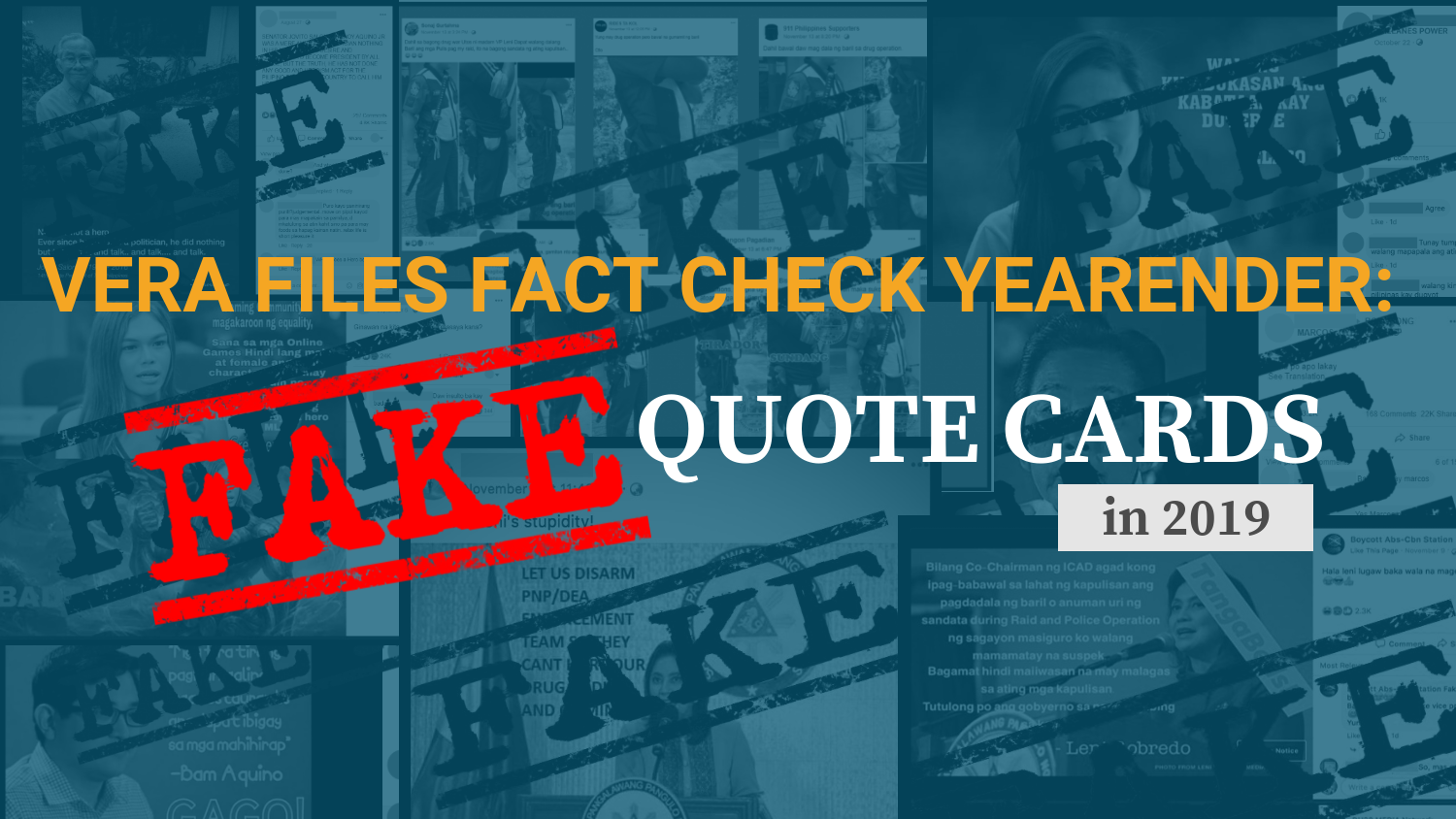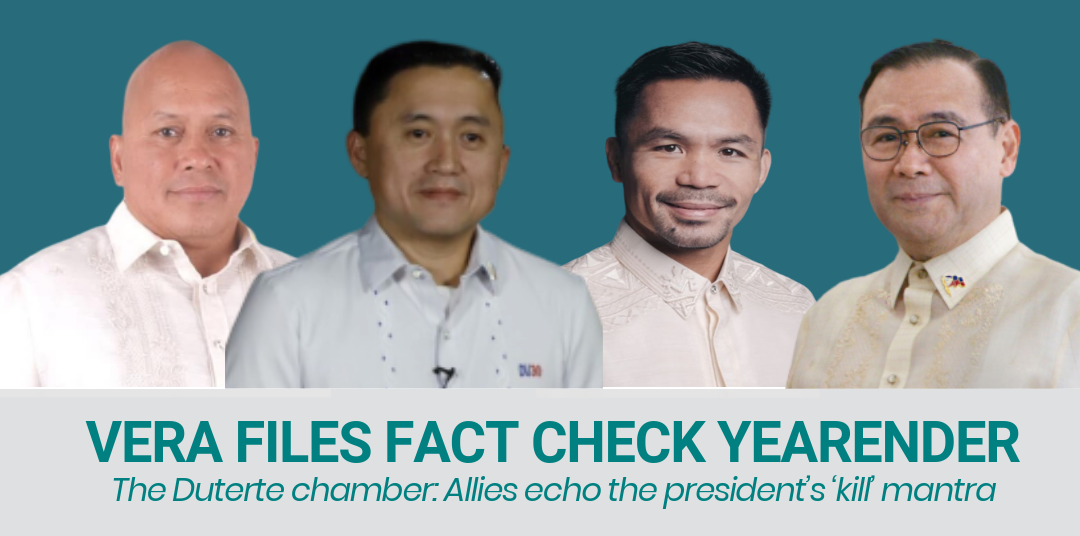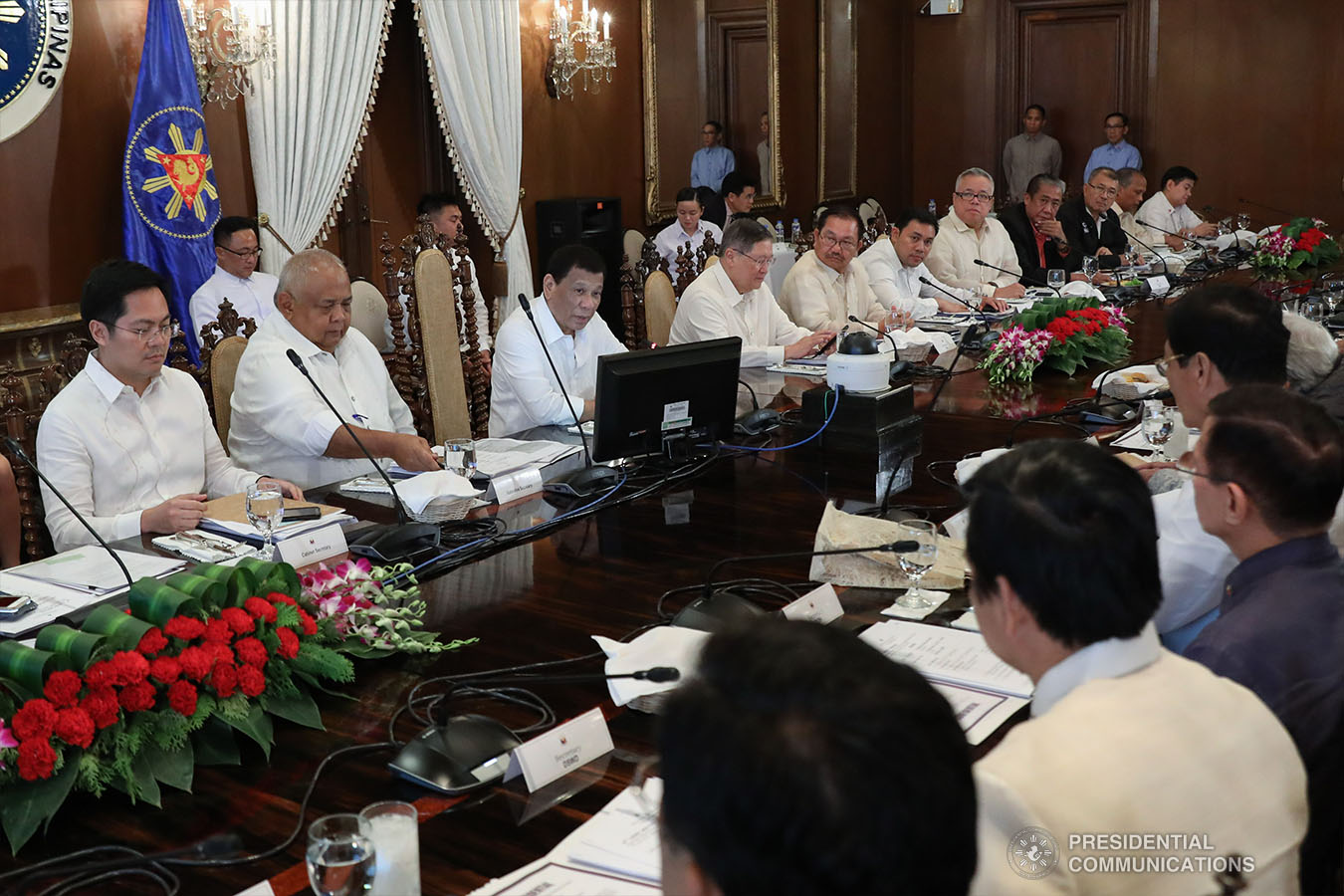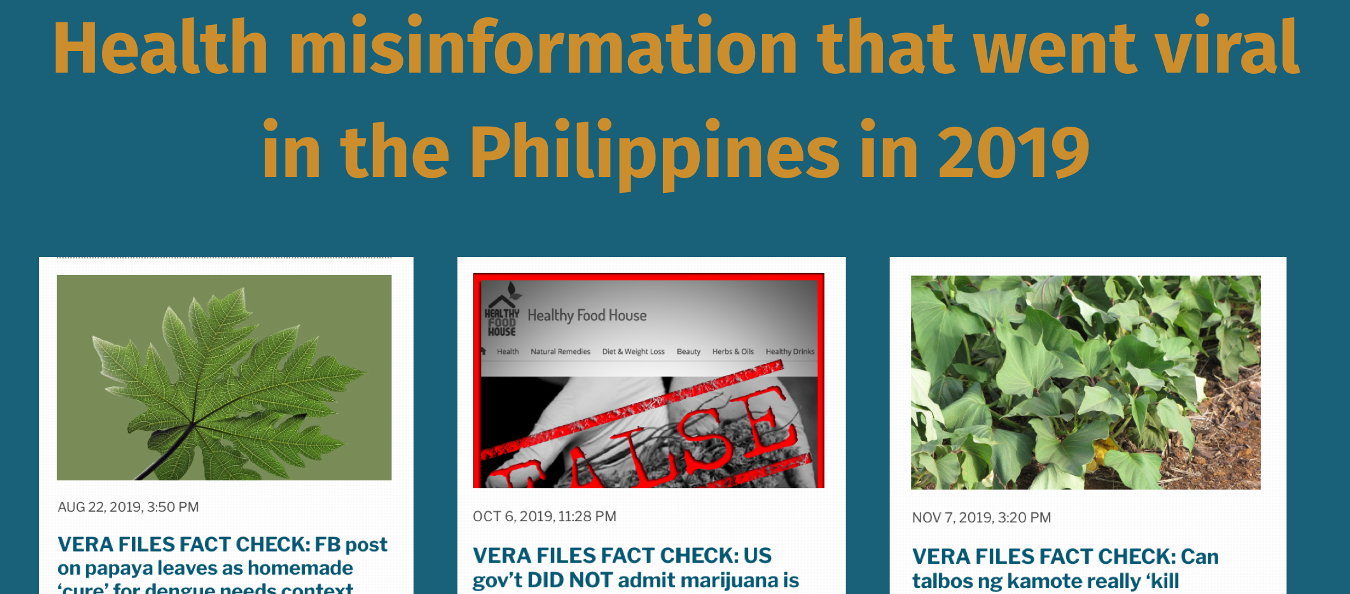In 2019, quote cards were the most preferred format to spread online disinformation followed by videos and full-text articles as tracked by Vera Files in its fact-check project with Facebook. Duterte critics were the usual targets of viral fake quotes, with Vice President Leni Robredo on top of the list.
Three days after Robredo was appointed co-chair of the Inter-Agency Committee on Anti-Illegal Drugs (ICAD), a Facebook (FB) post featuring a fake quote card of the vice president went viral on the Internet.
The post, which was shared over 18,000 times in less than a day, made it appear that Robredo said she would “ban” the police from carrying any weapon during drug operations to “assure” that drug suspects would not be killed. Robredo said nothing of the sort.
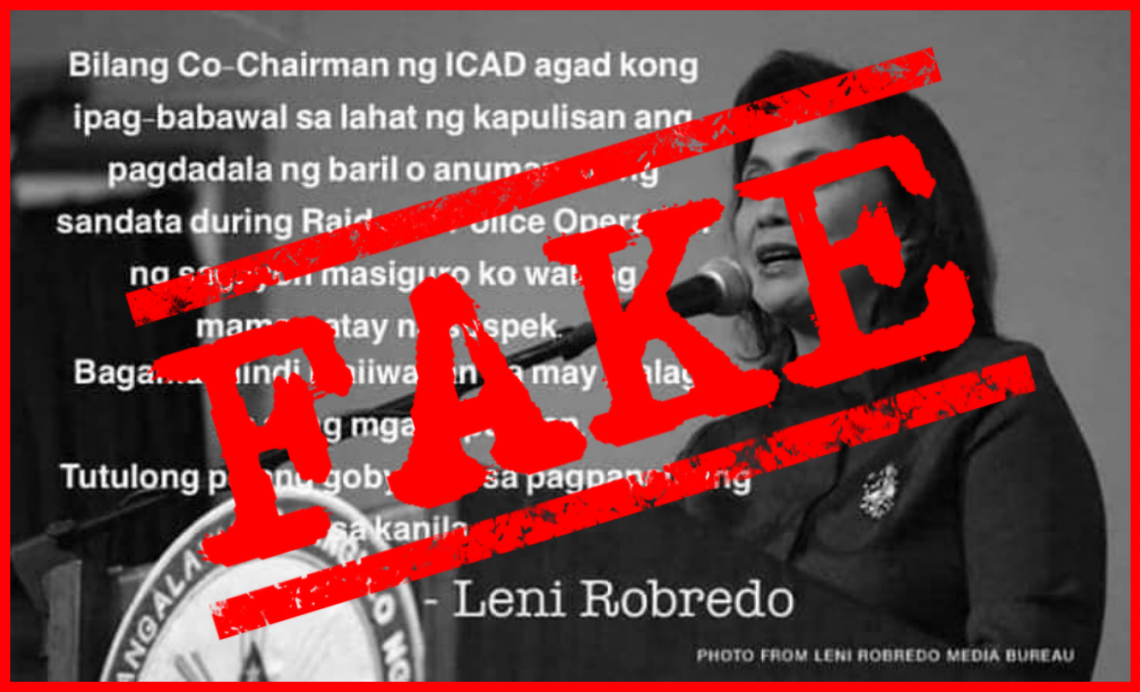
Several netizens continued sharing the post even after it was flagged as fake by VERA Files Fact Check in FB’s Third-Party Fact-Checking program.
A quote card is composed of a personality’s photo juxtaposed with a pull quote, or a part of that person’s statement. News organizations use quote cards of public figures as a way to make information more digestible to their online audience.
As quote cards are easy to create, it has become one of the most common formats used to spread online disinformation.
Out of 173 viral online posts tracked and verified by VERA Files Fact Check in its partnership with Facebook from January to Dec. 17, 2019, 42 or almost a quarter of them were fake quote cards. This makes the format the most preferred way to spread online disinformation in 2019 by our count, followed by videos and full-text articles with 36 each.
The Robredo infographic was the most shared fake quote card within 24 hours.
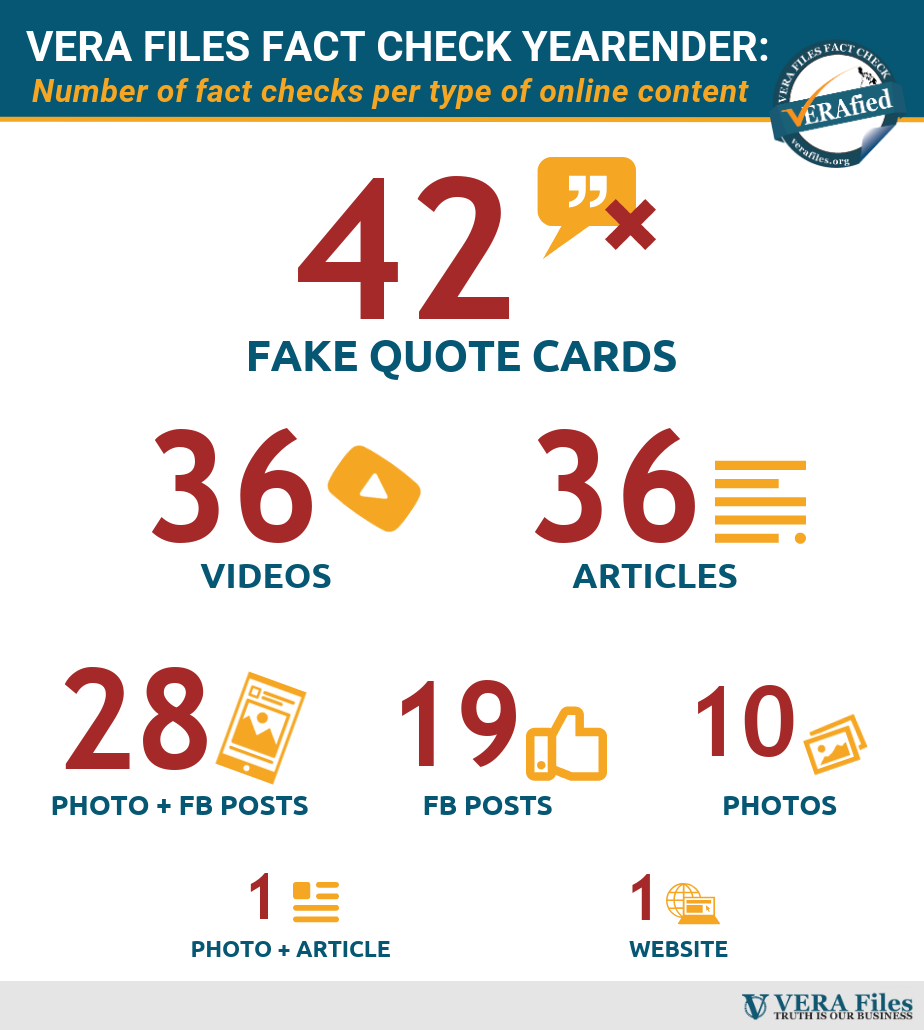
We looked into the 42 fake quote cards and found the following patterns.
Critics of the Duterte government were top targets
The 42 viral quote cards featured only 26 personalities — 11 of whom are known critics of the Duterte administration and its policies, while one is associated with the political opposition.
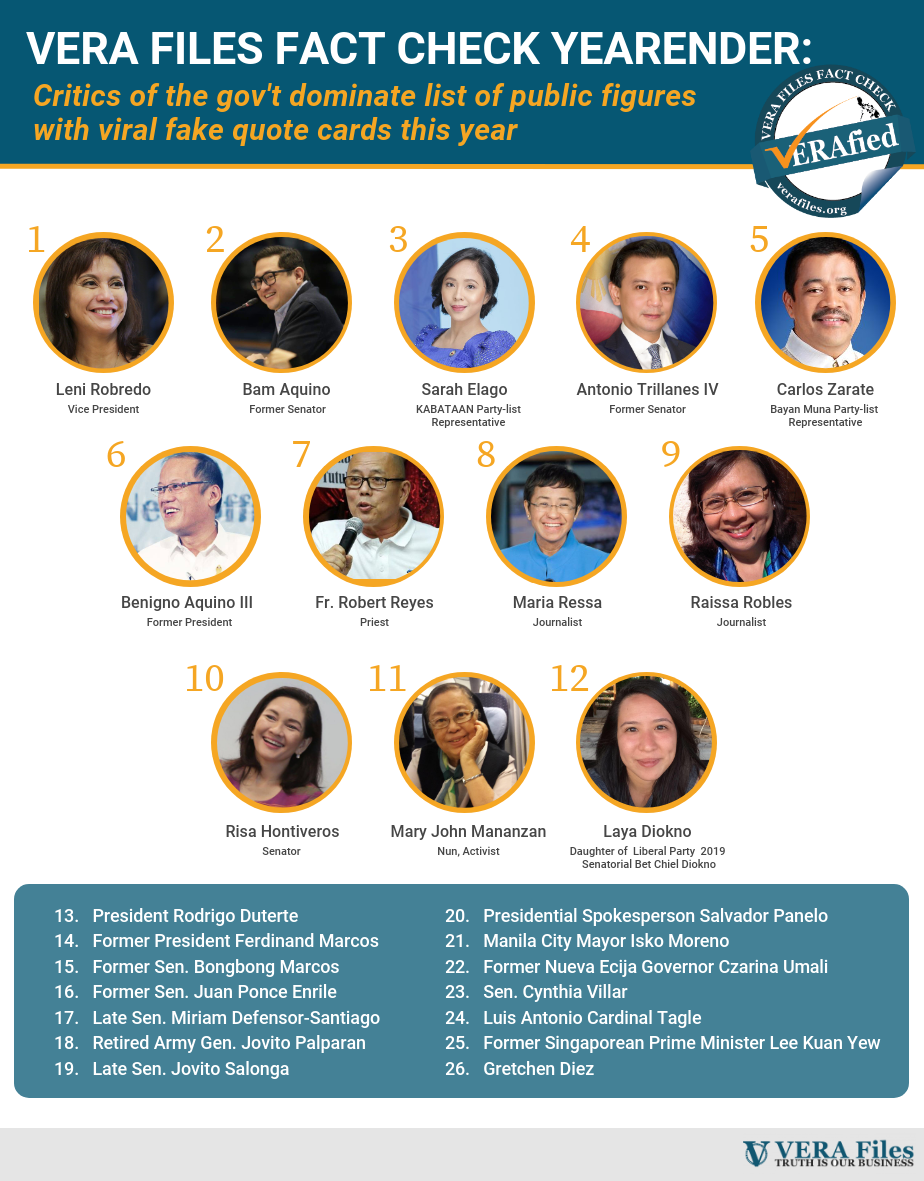
Robredo was the most targeted, with six fake statements attributed to her. Half of these went viral after she assumed her appointment as co-chair of the anti-drug inter-agency committee in November, including the one about her “wanting” to prevent police officers from bringing guns and other weapons in drug operations.
Most of Robredo’s fake quote cards depict her either as someone who speaks nonsensical statements, or someone who protects drug suspects. A number of posts tag the vice president in its captions with derogatory terms, such as “mema” or someone who says anything for the sake of having something to say; toxic; “lugaw (porridge),” a nickname given to her by critics after a Lugawan project initiated by her supporters during the 2016 elections; and stupid.
In 2018, the vice president was also the “most common subject of negative coverage” among online disinformation tracked by VERA Files Fact Check. (See Duterte, allies reap the most benefits from disinformation)
But not all individuals targeted by fake quote cards were political figures.
Transgender woman Gretchen Diez was targeted by five different quote cards in less than two weeks, each of them getting 39,000 or more online interactions. She made headlines in August and September when she went live on Facebook after being prevented by a janitress to use the women’s restroom in a shopping mall in Cubao, Quezon City.
The fake statements attributed to Diez portrayed her as a representative of the lesbian, gay, bisexual, transgender, and queer (LGBTQ+) community with absurd demands — like naming typhoons using “transgender names,” wanting exclusive schools for the LGBTQ in each city in the country, and declaring gay lingo as the national language of the Philippines — in the guise of forwarding gender equality.
Fake quote cards proliferated in the midterm elections
One third or 14 of the fake quote cards debunked this year were of personalities involved in the May 2019 midterm elections.
Former Sen. Paolo Benigno “Bam” Aquino, who is not new to being prey to online disinformation, and newly elected Manila Mayor Francisco “Isko” Moreno Domagoso had three fake quote cards each.
Tsek.ph — a collaborative fact-checking project launched for the 2019 midterm elections which VERA Files is a part of — found in its post-election report that Aquino, alongside fellow Liberal Party senatorial bet Manuel “Mar” Roxas, was “the most targeted (candidate) by mis- and disinformation in the midterms.”
In election-related online content flagged by VERA Files Fact Check in 2018, Aquino was depicted as a credit grabber and a hypocritical traditional politician (trapo). This year, he was portrayed as inconsiderate to the poor and hypocritical, specifically in dealing with farmers, as his name is easily associated with the 2004 Hacienda Luisita massacre in a Cojuangco-owned farming area in Tarlac. The former senator had nothing to do with the incident.
Moreno, meanwhile, was targeted more by online disinformation after he won as mayor of Manila.
Of the three fake statements attributed to Moreno, two depicted him as someone who makes brazen statements, like exposing local officials receiving “kickbacks” from government projects, and banning Muslims in Manila.
Two of the mayor’s fake quotes that were shared 13,500 times in total was posted by Facebook page RIP Manila.
The page, created May 21 or only a week after the midterm electionshas 11,600 followers, and is known for publishing content highly critical of Moreno.
Former Nueva Ecija Governor Czarina Umali has a similar case. Two fabricated quote cards attributed to her went viral a few months before the elections, where she ran for representative of Nueva Ecija’s third district. Both posts were published by then FB page NE Patrol — now NE Unang Singaw – Partido Pangagago — which was created only in January 2019 and has the reputation of being critical of Umali and her policies as evident in its posts.
Umali lost to opponent Rep. Rosanna “Ria” Vergara in May.
Pages and groups sharing fake quote cards bear variations of ‘Duterte,’ ‘Marcos’ in their names
The 42 viral fake quote cards were posted as original content by at least 70 accounts composed of FB pages, FB public groups, domains, and private netizens. More than half or 36 of these accounts are FB pages.
Though pages generated the most number of interactions and shares for these quote cards, it is in FB groups that these fabricated images were shared repeatedly. Eight of the top 11 most frequent sharers of fake quote cards are public FB groups
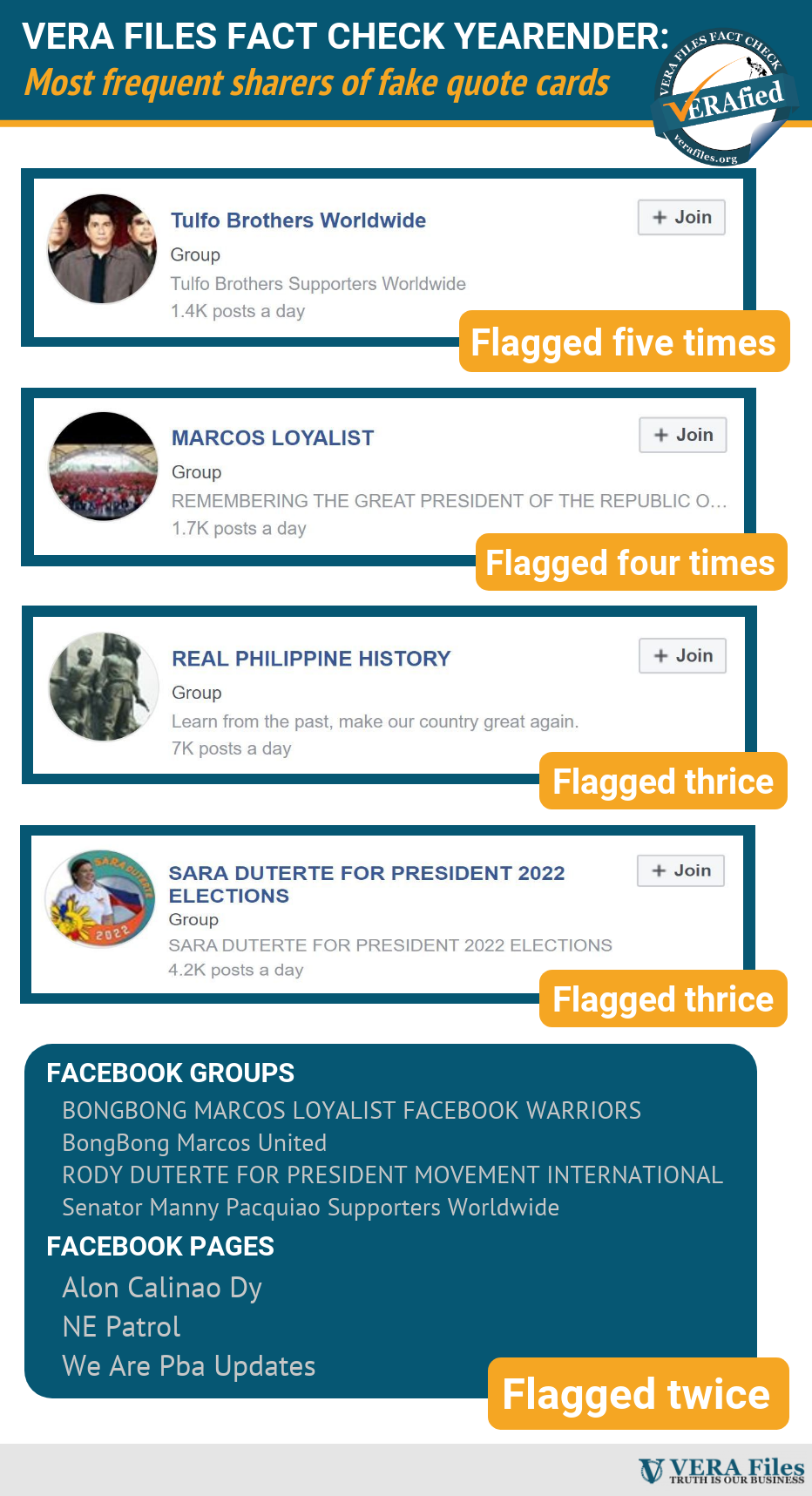
Of the 54 FB groups and pages identified, 19 carry the words “Duterte,” “Du30,” “DDS,” or “Digong” in their names, while 15 have the word “Marcos” or “BBM.”
In 2018, an analysis of 193 viral online disinformation flagged by VERA Files Fact Check from April to October showed that President Rodrigo Duterte and the Marcoses were the “most popular beneficiaries of online disinformation.” Apart from reaping the benefits from favorable content, the name “Duterte” appeared on 60 FB pages that served as online traffic generators to disinformation items, while “Marcos” was on 13. (See Duterte, allies reap the most benefits from disinformation)
<span id=”selection-marker-1″ class=”redactor-selection-marker”></span>
Three FB groups are named after the Tulfo brothers, known to be avid supporters of the Duterte administration. These FB groups are Raffy Tulfo In Action Supporters, Raffy Tulfo Supporters, and Tulfo Brothers Worldwide.
Raffy Tulfo’s wife, Jocelyn Tulfo, is one of the three representatives of the Anti-Crime and Terrorism Community Involvement and Support (ACT-CIS) Partylist in the 18th Congress.
These FB groups generated traffic to a total of seven quote cards, five of which targeted members of the media, and critics of the Duterte administration’s policies, namely Sen. Risa Hontiveros, former President Benigno Simeon “Noynoy” Aquino III, activist nun Sr. Mary John Mananzan, and priest Fr. Robert Reyes.
Majority of fake quote cards had completely fabricated statements
Creators of fake quote cards tracked by VERA Files Fact Check used only two deceptive techniques this year: they either attribute a completely fabricated statement or twist a personality’s existing quote and mislead netizens by manipulating it or taking it out of context.
Thirty-six of the 42 fake quote cards flagged were downright fake. For instance, a fake quote card claiming opposition Sen. Risa Hontiveros said “kidnapping is okay as long as the victim does not get hurt” went viral in March. It got a total of around 32,200 online interactions and a potential reach of over 1.3 million netizens despite there being no official record of, or legitimate media report on, such a pronouncement by the senator.
The remaining six quote cards used real statements and presented them in the wrong context.
An example of this is a statement attributed to activist priest Reyes in July, the same month Sen. Manny Pacquiao won against boxer Keith Thurman, saying “boxing can’t pull the country out of crisis.” In truth, Reyes’ statement was a year old and was pulled from an opinion piece, which was also taken out of context.
Still, the post had a potential reach of over 1.5 million netizens.
Sources
Lifewire, How to Use Pull Quotes to Add Visual Flare to Articles, Aug. 13, 2019
ABS-CBN News, Leni explains where campaign funds come from, May 3, 2016
Bulgar Online, Hindi maiaahon sa krisis ang bansa ng boksing, July 17, 2018
(Guided by the code of principles of
the International Fact-Checking Network at Poynter, VERA Files tracks
the false claims, flip-flops, misleading statements of public officials
and figures, and debunks them with factual evidence.
Find out more about this initiative and our methodology.)
